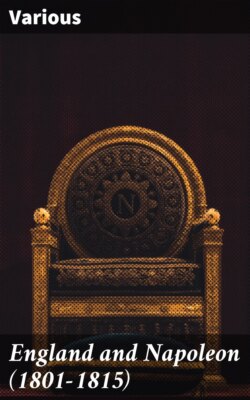Читать книгу England and Napoleon (1801-1815) - Various - Страница 17
На сайте Литреса книга снята с продажи.
II. FINANCE.
ОглавлениеTable of Contents
1. Treasury Statements of Annual Income and Expenditure of Ireland assimilated to the British series of Public Accounts, and adapted to the same annual and quarterly periods.
2. Revenue Boards.—Examination into its past state by personal conference with each of the four senior Examiners; all of them agreeing that it was corrupt and inefficient; proved also by lists of Officers accused and protected; proved also by reports of Mr. Beresford, in 1792; and of the Acting Surveyor-General, Mr. Cooke, in 1800.
Division of the Board into Customs and Excise, as projected in Lord Townsend’s and Lord Buckingham’s Administration, and executed now in the manner prescribed by Mr. Beresford, in a letter written by himself on a former occasion; a copy whereof was delivered to me by Mr. B., with a recommendation of its being adopted for this purpose at this time.
Dublin Quay Regulated.—Tobacco stores, gate notes, &c., under advice of the Board, and upon suggestion and report of Mr. Croker, who was appointed acting Surveyor-General of the port, with joint approbation of Mr. Beresford and Mr. Annesley, and established in the Office of Surveyor-General by Lord Hardwicke.
Regulations enforced prohibiting all Revenue Officers from being traders.
Revision and Amendment of the Distillery Laws considered. Throughout Ireland the Surveyors-General ordered to report quarterly from their actual surveys.
N.B.—Dublin Customs’ duties are one half, and Dublin Excise duties one quarter of all Ireland.
A mode settled for passing Collector’s accounts in Dublin with more expedition, and (as in England) without their personal attendance.
Cruisers called in; inspection of repairs ordered, and a report upon the future complement of men for their Peace Establishment.
Additional officers appointed, not for patronage, but upon special reports of the Board, and upon considerations of personal merit, viz. two Surveyors-General, one Inspector-General, and one Inspector, and two Landwaiters in the Port of Dublin.
General plan for prevention of smuggling and illicit distilleries prepared for consideration.
Commercial regulations between Great Britain and Ireland considered, and reported upon by the Commissioners of Revenue.
3. Auditors of Public Accounts.—Their accounts methodised on the British plan, and brought up to 5th January, 1802, showing the actual amounts of debts due from Public Accountants.
4. Stamps.—After a previous investigation by the Treasury, and personal conference repeatedly with the Commissioners.
Establishment settled on the British model, and report upon the building purchased for the use of this Office before the Rebellion.
Consignments to distributors, and the appropriation of their receipts new modelled.
Debts from deceased and dismissed distributors called in; securities of distributors raised.
Inspectors-General ordered upon survey throughout Ireland, and to make quarterly reports; and two new inspectors added at inferior salaries, with prospect of succession to the higher, if merited.
Revision and amendment of the Stamp Laws prepared.
N.B.—Last summer, in the counties of Wicklow and Wexford, several Justices of Peace refused to convict in penalties for evading the Stamp Duties.
5. Crown Lands.—A report upon their state, extent, and value ordered to be made out in thirty-two books for the thirty-two counties.
6. Board of Works.—Appropriation of issues between May 1801, and August 1801, viz. 20,000l. having been called for, and no account being produced of time or place, of articles supplied, or work done, nor any check appearing; an inquiry directed for settling an efficient system of checks for the future; report made and instructions issued to take effect prospectively from 5th January, 1802.
N.B.—By Comptroller of Accounts (who has controlled the Barrack Accounts), and two Privy Councillors.
All the old accounts ordered to be balanced and closed to 5th January, 1802, where a debt stated in November to be 11,000l., was stated in January to be a debt of 37,000l.; though no new work was ordered or executed in the interval. And it appeared also that no final accounts had been settled with the tradesmen for [1] years. How many years?
N.B.—During the period within which this debt was incurred, there was an annual issue to the Board of from 25,000l. to 32,000l. a year. No new building, except one house, which cost 3,000l., was erected. The Castle or public apartments are worse furnished than any private gentleman’s house in England.
Note.—The First Commissioner of the Board, consisting of seven, is also sole Barrackmaster-General; and has the sole expenditure of nearly 300,000l. a year. And the latest of his accounts delivered in to be audited, viz. March, 1800, did not come down to a later period than 25th March, 1796.
N.B.—Lord Tyrawley, from a very moderate beginning, is reputed to have made a landed property of 10,000l. a year, out of private trusts (viz. law arrears, &c.), and out of public offices, viz. the Board of Works and Barrack Office.
As to the economy of his department, ex uno disce omnes. Ready-made sentry-boxes sent in carts from Dublin to Cork. Extravagant expense of carriage, and destruction of the articles themselves.
